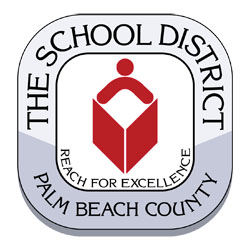More money is in the state budget for schools, teachers’ salaries and retirement benefits this year, although still not up to what it was before the start of the economic downturn, Palm Beach County School District lobbyist Vern Pickup-Crawford told the Royal Palm Beach Education Advisory Board on Monday.
Pickup-Crawford said the school district’s list of legislative priorities was presented to the Palm Beach County Legislative Delegation earlier this month. The 2013 legislative session begins March 5 and ends May 3.
Gov. Rick Scott’s budget was released last week, and Scott spoke about it at a Forum Club luncheon Monday at the Palm Beach County Convention Center.
“The governor was extremely congratulatory of the work the teachers are doing across the state,” Pickup-Crawford said. “He was appreciative of the work that the school board and the school system are doing here in Palm Beach County. As a result, we got a good feeling from that.”
Scott’s budget overall reflects what he has been saying about tying education closer to jobs and employment, which Pickup-Crawford said makes sense in terms of economic development.
“The linchpin of his proposal is that he has about $480 million he proposes to be used for teacher pay raises,” he said. “This is for regular classroom teachers, and it’s an average in a sense of $2,500 per teacher. The money would come to school districts expecting that there would be that average, but obviously, it is subject to collective bargaining, and there could be a range depending on how it is bargained at the local level.”
Pickup-Crawford pointed out that the dollars are not tied at this point to the pending mandatory state merit pay plan that the school districts are developing. “He is purely looking at this as being recognition for the job the teachers are doing, and it is meant to be a pay raise across the state. He also has this as a sustainable recommendation,” he said. “This is not a one-time bonus.”
Scott also proposed financing in his budget to help cover the employer retirement contribution, since rates are going up in Florida. “He has some $300 million in the budget for that statewide,” Pickup-Crawford said. “He is increasing dollars for technology as a category, which would also benefit some of our charter folks as well. There’s $100 million statewide. That translates to about $6.5 million for Palm Beach, which honestly is not a lot, but it’s more than we have today.”
The budget represents an actual increase from the previous year. “It is the second increase that we’ve had, so we’re hoping that the series of budget cuts has certainly bottomed out,” Pickup-Crawford said.
The overall money for education is still lower than 2004 because the local property tax rolls are still down, and the school district has no recommendations to increase local tax rates.
“From the standpoint of the local budget, I would say [Scott] is putting his money where his mouth is,” Pickup-Crawford said. “He has talked about improving education, and there is a record amount of state dollars going into education.”
At the federal level, Pickup-Crawford is watching what will happen with the so-called “sequestration” budget. He said it could directly affect Title I money, which provides instructional services for disadvantaged children; Title II money, which provides teacher training; and Title III money, which includes English proficiency programs.
Pickup-Crawford said he anticipates some reduction in overall federal funding per student nationwide. “We are preparing for that, but that is why we are watching what is going to happen with sequestration,” he said.
Florida educators are also watching what will happen at the state level with increased requirements for end-of-course exams for state testing, and the Partnership for Assessment of Readiness for College and Careers (PARCC), which is to replace the Florida Comprehensive Assessment Test (FCAT).
“It also dovetails into the issue of teacher and principal evaluation, and also technology,” he said. “There are some people in Tallahassee who are very pleased with themselves about the fact that they are trying to fly the airplane while they are still building it. I would suggest to you from an engineering standpoint that’s not really feasible.”
The Palm Beach County School District has joined others in suggesting that legislators need to step back and see how all of it will really fit together, he said. “We’ve had separate laws passed in 2010, 2011, 2012 individually, and this would be a great time to see how this meshes and what adjustments and accommodations we need to make,” Pickup-Crawford said.
He said questions still remain for assessments of special education and limited English students, and how end-of-course testing will be financed, as well as evaluation of technical training. Issues still remain with writing skills testing, which will be done on a keyboard and includes third-grade students, meaning they must be proficient on a keyboard.
He also pointed out that since many of the programs are tied to at-home study, not all homes have Internet connections.
“We have many neighborhoods that don’t have Internet at this point,” Pickup-Crawford said. “Until you get that, you’re not going to have an equal system, or perhaps, an adequate system in place. That’s why we’re suggesting to Tallahassee that we need to take a look at this.”








